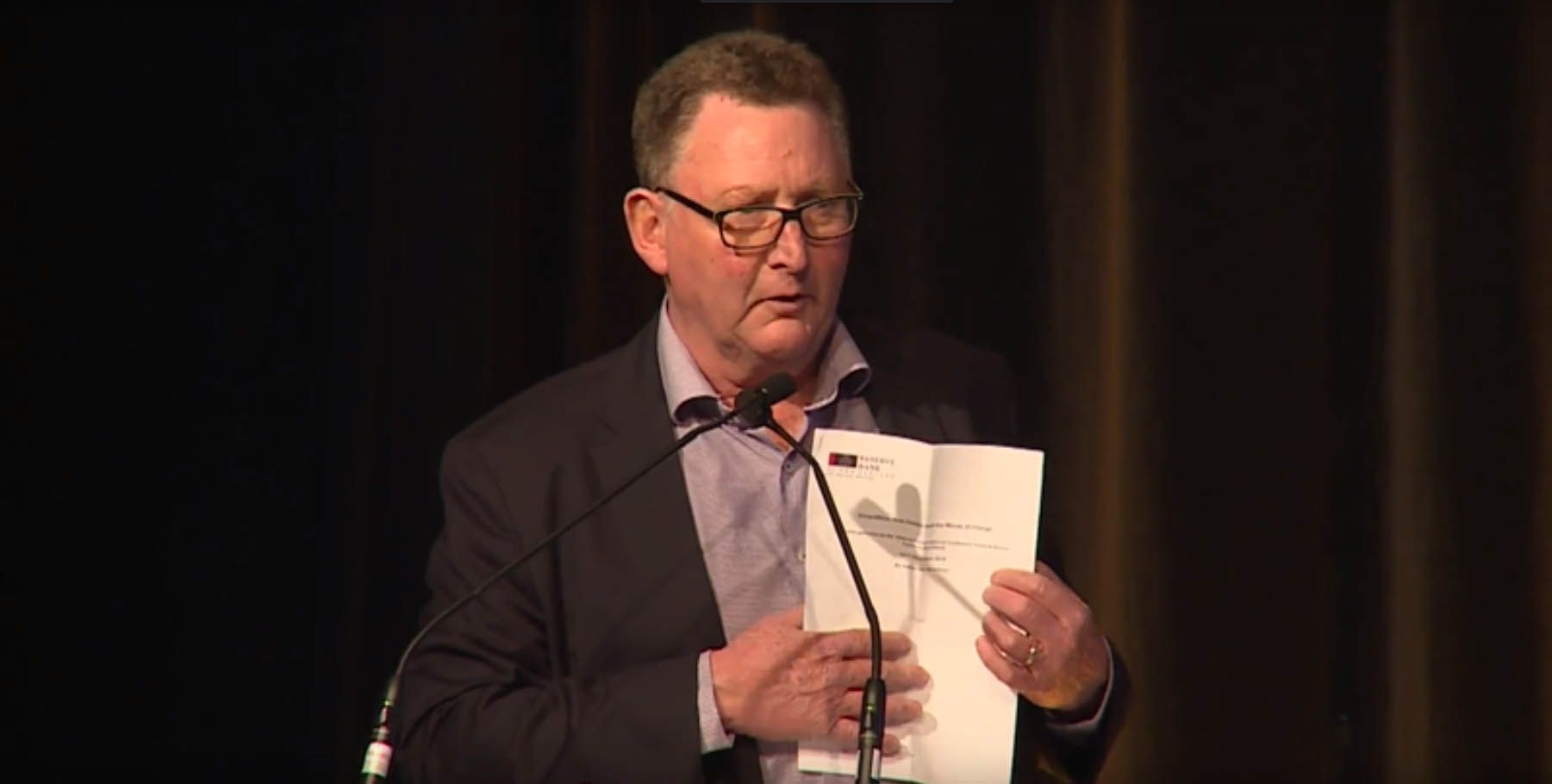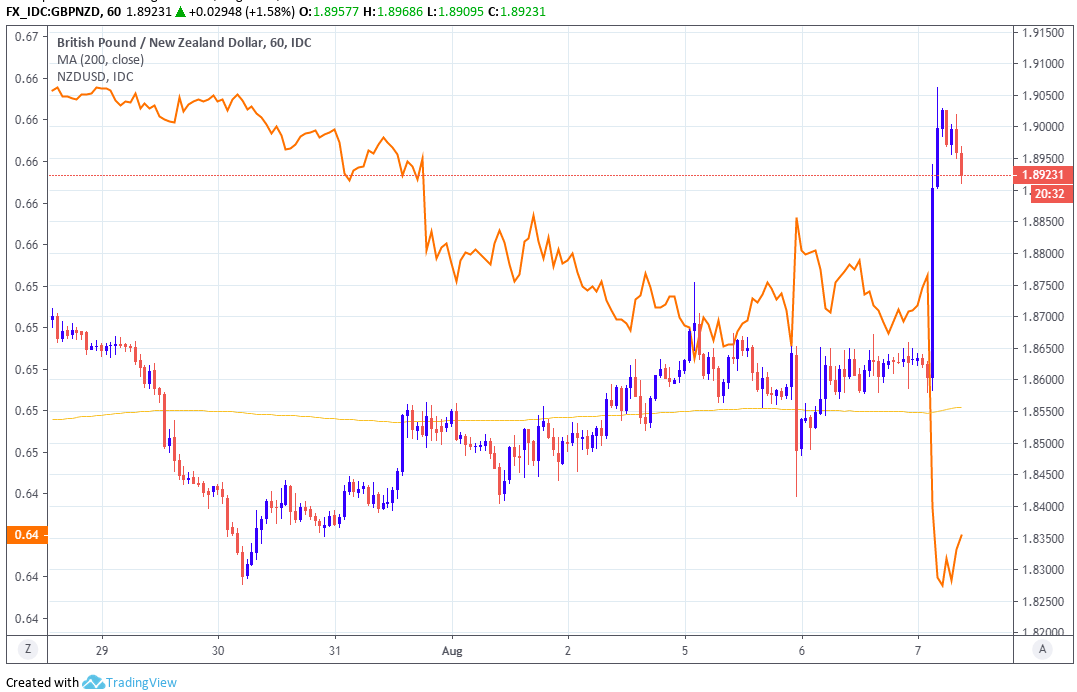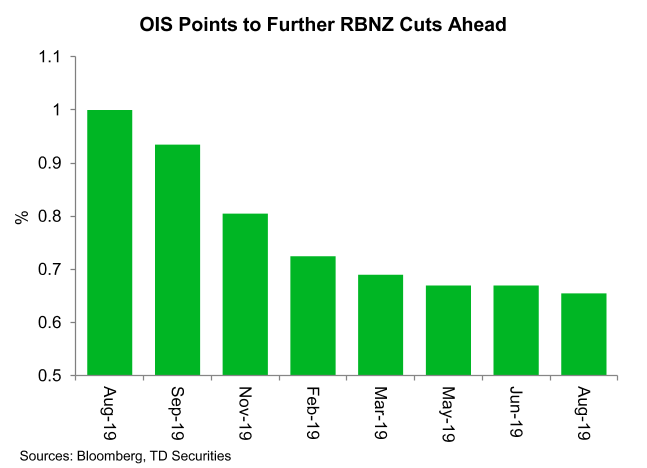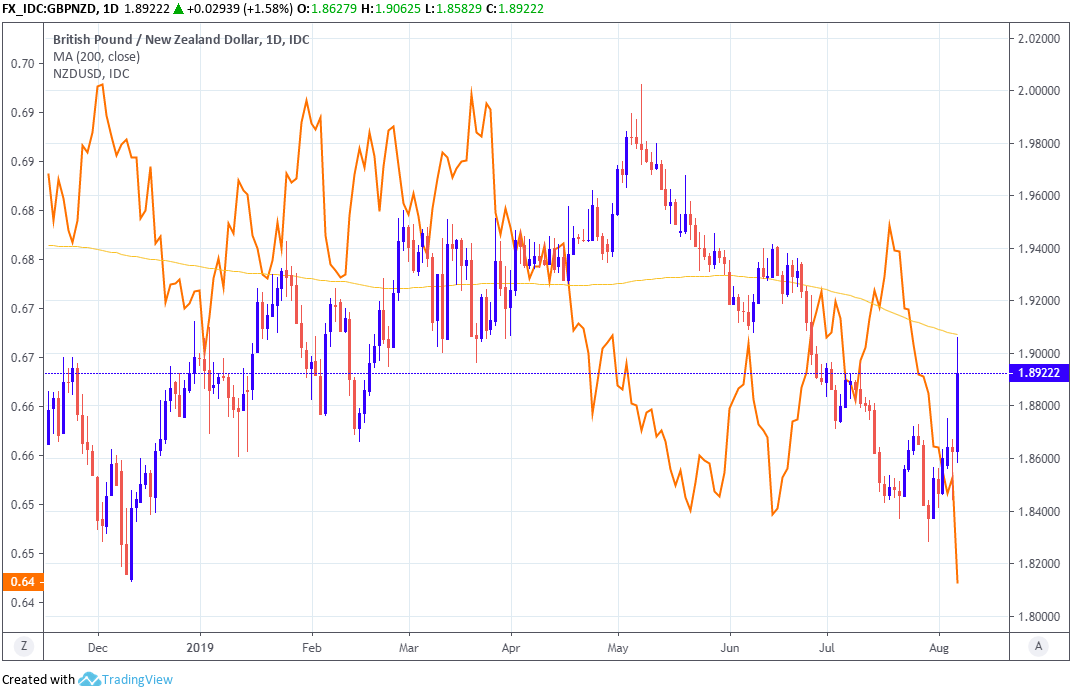New Zealand Dollar Forecast to Hit New Lows amid RBNZ Promises to "Leave No Powder Dry" in Quest to Boost Economy
- Written by: James Skinner

Above: RBNZ Governor Adrian Orr. File Image © Pound Sterling, Still Courtesy of Financial Services Council NZ
- NZD crushed after RBNZ surprise market, cuts interest rate by 0.5%.
- RBNZ hints more rate cuts are on the way as global economy slows.
- ING looks again at forecasts as TD Securities eyes lower NZD range.
- ANZ looks for another RBNZ cut this year as HSBC forecasts losses.
The New Zealand Dollar was crushed Wednesday after the Reserve Bank of New Zealand (RBNZ) slashed its interest rate further than markets expected and gave guidance that was more 'dovish' than anticipated, but analysts say there's more losses ahead because the bank is likely to cut again before long.
The Reserve Bank of New Zealand cut its interest rate by 50 basis points to a new record low of 1.25% Wednesday when financial markets had looked for only a 25 basis point reduction, taking the market by surprise and prompting traders to dump the Kiwi currency by the bucketload.
Wednesday's cut was all the more significant because it followed second quarter employment data that showed the Kiwi jobless rate falling to an 11-year low and wages beginning to rise at an accelerated pace, offering a glimpsDoe of the inflation pressures the RBNZ is attempting to foment.
RBNZ Governor Adrian Orr told markets that Kiwi employment is now around its maximum sustainable level but that the inflation rate remains beneath the elusive 2% midpoint of the 1%-to-3% target band and further monetary stimulus to prevent both from easing in the months ahead.
"Not only that, we got Governor Orr basically promising to do whatever it takes: more rates cuts, negative rates, QE – you name it. There will be no keeping the powder dry, he noted, and pushed for fiscal stimulus, openly stating this was due to the gloomy global backdrop," says Michael Every, a strategist at Rabobank.

Above: Pound-to-New-Zealand-Dollar rate at hourly intervals, and NZD/USD (orange line, left axis).
"The NZDUSD has taken quite a blow from this policy action, dropping to 0.6423 before pulling back a little," says Rob Carnell, Asia-Pacific chief economist at ING. "We will have to consider whether or not to add further easing to our RBNZ forecast, as today's decision delivers what we had penciled in for the rest of the year. Our initial gut feeling is, that we probably will. It also begs a re-look at the RBA forecast, where we only had one further rate cut forecast. "
The global economy is weak due to declining international trade and mounting fears among businesses about the damage President Donald Trump's trade war with China will yet have on the outlook for growth in the future. Orr says this means the slowing Kiwi economy is unlikely to receive much support from the international environment.
Orr and the Monetary Policy Committee downgraded forecasts for Kiwi economic growth Wednesday and said that increases in spending will be required from companies, consumers and the government if the inflation target is to be met anytime soon. New Zealand GDP growth fell from 4% to 3.2% during the 12 months to the end of March 2019 and is projected by the RBNZ to decline to 2.6% for the year to March 2020.
The RBNZ has now cut its interest rate twice this year but the bank suggested Wednesday that even further reductions are on the way in the quarters ahead. It's projection is for New Zealand's bencmark of borrowing costs to fall below the 1% threshold early next year, although some analysts say the risk is of another cut coming before then. Financial market pricing implies an 80% chance the RBNZ cuts the cash rate to 0.75% in November.
"NZD has fallen sharply in the wake of today's policy actions. With the door wide open to further easing, NZDUSD has slid to its lowest level since early 2016. While we have grown cautious in recent weeks in taking too strong a directional cue from even a profound central policy shift, it does appear that spot has entered a new, lower trading range," says Ned Rumpeltin, a strategist at TD Securities. "Key to this will be spot's ability to hold below 0.6425 as 0.6350 becomes the next target lower for bears."

Above: Market expectations for RBNZ cash rate. Source TD Securities.
"Things could turn to custard before the September OCR review in seven weeks but a lot of custard looks baked in already at this point. We therefore maintain our forecast of a further cut in November, taking the OCR to 0.75%," says Sharon Zollner, chief economist at ANZ.
Changes in rates are normally only made in response to movements in inflation, which is sensitive to growth, but impact currencies because of the push and pull influence they have over capital flows. Those flows tend to move in the direction of the most advantageous or improving returns, with a threat of lower rates normally seeing investors driven out of and deterred away from a currency.
The RBNZ has long had to contend with below-target inflation and has now resorted to cutting its interest rate and calling for a pickup in government spending in order to aid the economy, which has a large agricultural commodity trade with the rest of the world and a significant exposure to the Chinese economy. China's economy has slowed since the trade war with the U.S. began in 2018 and is expected to ease further in the quarters ahead.
New Zealand's Dollar fell sharply Wednesday as a result of the rate cut, although analysts at HSBC forecast last week that the NZD/USD rate could decline all the way to 0.62 by year-end due to the RBNZ's policy and developments in the international arena, which would put the exchange rate at its lowest level since September 2015 and the peak of the commodity price collapse. The Pound-to-New-Zealand-Dollar rate is forecast to rise from 1.8895 to 2.20, a post-Brexit referendum high.
"The plunge of the New Zealand dollar today in response to the aggressive action of the RBNZ does not have huge implications but undoubtedly it will further encourage President Trump’s thinking that the US needs to do more to counter the appreciation of the dollar," says Fritz Luow, an analyst at MUFG.

Above: Pound-to-New-Zealand-Dollar rate at daily intervals alongside NZD/USD (orange line, left axis).
Wednesday's rate cut comes at a time when financial markets have been on edge over the prospect of the U.S.-China tariff fight turning into a currency war after the People's Bank of China (PBOC) allowed the Renminbi to depreciate this week. It fixed the midpoint of Wednesday's trading band for the USD/CNY rate at 6.9996 Wednesday, close to the psychologically important 7.0 level the market has traded above all week.
The U.S. has already declared China a "currency manipulator" as a result of the PBOC's decision and markets are increasingly conscious of President Trump's rhetoric around the value of the U.S. Dollar and his calls for the Federal Reserve (Fed) to set its interest rate policy to ensure the greenback weakens. A strong Dollar makes imports cheaper for Americans to buy and risks exports by making those more expensive for other countries to buy.
Some analysts say Trump has got little chance of seeing either of those two things happen including those at MUFG, who've warned that a weak global economy will continue to support the U.S. currency. Those lower fixings for the state-managed Renminbi followed a decision by President Donald Trump to target China's remaining $300 bn of annual exports to the U.S. with a 10% tariff from September 01. The White House has already imposed a 25% tariff on the rest of China's exports to the U.S.
"President Trump is undoubtedly going to be frustrated but we see little that can be done. The Fed can ease further but the US dollar cannot weaken given the weakness of global growth and the responses of global central banks. The IMF is unlikely to be sympathetic either. The US dollar is overvalued but for sound fundamental reason," Luow writes, in a morning briefing to clients.
Time to move your money? Get 3-5% more currency than your bank would offer by using the services of foreign exchange specialists at RationalFX. A specialist broker can deliver you an exchange rate closer to the real market rate, thereby saving you substantial quantities of currency. Find out more here.
* Advertisement




